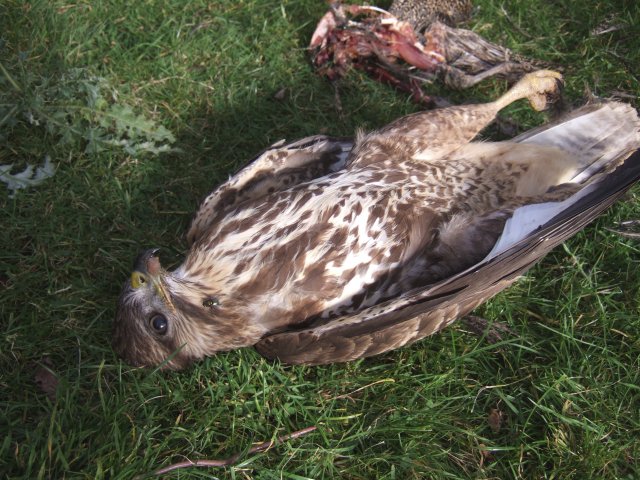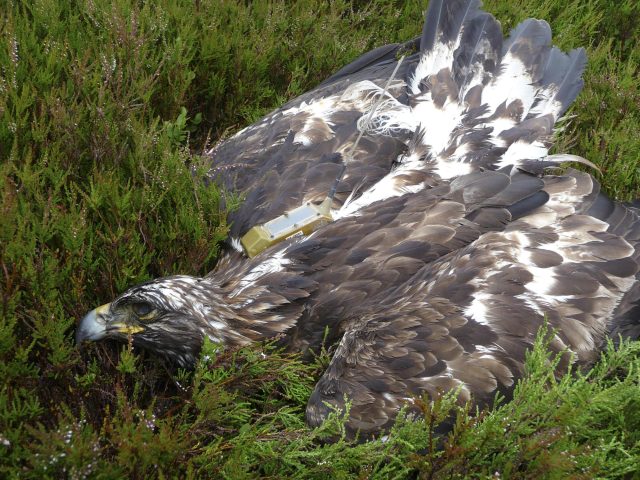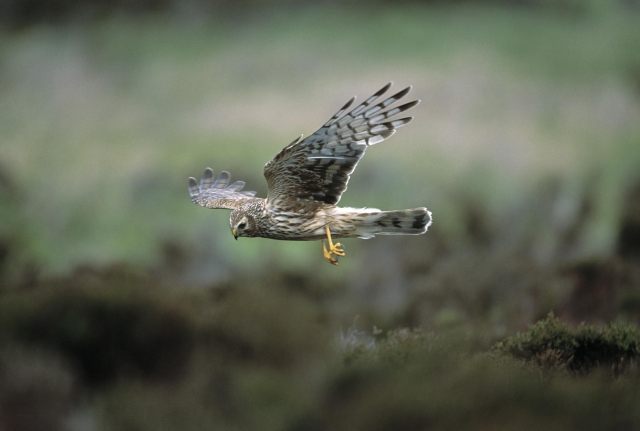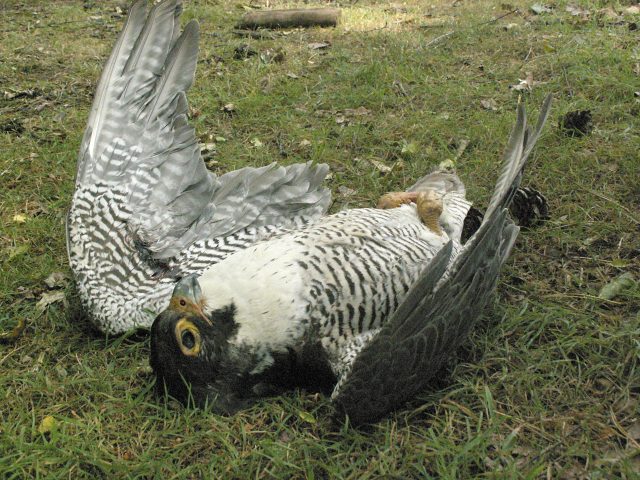20 years of shame as war continues against birds of prey
2009 was another shocking year for the persecution of birds of prey, with 384 reported incidents of shooting, trapping and poisoning, according to the RSPB's 20th annual Birdcrime report, launched today [16th September, 2010]. This makes 2009 the second worst year for these crimes in the last decade, with only 2007, with 389 cases, worse.
Twenty years of reporting on Birdcrime has revealed that several police force areas suffer higher levels of bird of prey persecution than others. In England, top of the league are North Yorkshire, West Mercia, Northumbria, Devon & Cornwall and Cumbria. In the report, the RSPB has identified 11 recommendations for government action, so that these appalling crimes can be eradicated.

This poisoned Buzzard started a major enquiry that led to the conviction of gamekeeper Ben Walker for multiple poisoning offences. (Photo: RSPB)
Dr Mark Avery, the RSPB's Conservation Director, said: "Wildlife crimes are an abhorrent feature of our countryside. And for the sake of eagles, kites, harriers, buzzards, falcons and Ospreys, we have to take more action to consign these crimes to history. Over time, egg collecting has diminished, but the killing of birds of prey is as big a threat today as it was two decades ago. Earlier this year, the former Wildlife Minister — Huw Irranca-Davies — was one of more than 210,000 people to sign a pledge to protect birds of prey. This is a powerful voice and we will not rest until their cries have been heard by government."

Wildlife Minister Huw Irranca-Davies (left) accepts a 210,567-name petition from Dr Mark Avery, RSPB Director of Conservation, calling for an end to the killing of brids of prey. The giant Peregrine mosaic was held aloft by RSPB supporters in Westminster. (Photo: David McHugh (rspb-images.com))
In 2009, the government announced that bird of prey persecution was one of the top wildlife crime priorities. In view of the current spending review, the RSPB is concerned that resources to tackle wildlife crime will be seen as a soft option. The RSPB wants to see a commitment from the government to tackling these crimes, long-term funding for the National Wildlife Crime Unit and a full wildlife crime review in England.
During 2009, there were 384 reported incidents of bird of prey persecution in the UK, including 224 in England, 123 in Scotland, 17 in Wales and 11 in Northern Ireland. Nine crimes against birds of prey could not be assigned to a country and were recorded at a UK level.

The poisoning of Golden Eagle Alma was a serious blow to Scotland's national heritage, Angus, Scotland. (Photo: Courtesy Ewan Weston)
The Hen Harrier is on the brink of extinction in England as a breeding species, with just six successful pairs in 2009. This is the species most affected by persecution, despite the fact there is sufficient habitat to support well over 200 pairs. A report published by Natural England in 2008 showed that nest failures as a result of adults 'disappearing' were seven times more common on grouse moors than any other land type. Modelling suggests the UK's driven grouse moors could support 500 nesting pairs of Hen Harriers: in 2008 there were just five.

Adult female Hen Harrier in flight, hunting at Loch Gruinart RSPB reserve, Islay. (Photo: Andy Hay (rspb-images.com))
There has been a huge expansion of the UK Red Kite population in the last 20 years. The exception to this is the north Scotland population. Despite being one of the first projects and in suitable habitat, the population has only just reached 50 pairs (compared to over 800 pairs in the Chilterns, where the same number of kites were released 20 years ago). Modelling work carried out by RSPB, published in Biological Conservation in 2010, showed that increased adult mortality caused by illegal poisoning could explain almost all of the difference in population growth between the north of Scotland and the Chilterns.
The conflict with land managed for the shooting of game birds remains the main problem for birds of prey, particularly the upland grouse-shooting estates in northern England and Scotland. The main birds of prey affected are Golden Eagle, White-tailed Eagle, Hen Harrier, Goshawk, Peregrine and Red Kite.

Shot Peregrine Falcon found dead in Gloucestershire in June 2009. (Photo: Grahame Madge (rspb-images.com))
The RSPB is concerned the shooting industry appears unable to self-police and the Society believes new legislation is required to make the managers and employers of those committing these crimes legally accountable. Options such as vicarious liability — that holds these people accountable for crimes committed by their staff — and removing the shooting rights for individuals and errant estates need to be considered. These measures would provide a significant deterrent without imposing a burden on legitimate shooting interests.
Although crimes against birds of prey are widespread across the UK, analysis of the figures by the RSPB over the past two decades shows that some constabulary areas are hotspots for wildlife crime. In England, since 1990, the five police forces with the highest levels of 'confirmed' crimes against birds of prey have been:
- North Yorkshire, with 64 confirmed bird of prey persecution incidents;
- West Mercia, with 61 confirmed bird of prey persecution incidents;
- Northumbria, with 58 confirmed bird of prey persecution incidents;
- Devon & Cornwall, with 57 confirmed bird of prey persecution incidents;
- Cumbria, with 47 confirmed bird of prey persecution incidents.
The Association of Chief Police Officers' lead for wildlife crime is Richard Crompton. In the report's foreword he states: "The illegal killing or persecution of birds of prey is totally unacceptable; the protection offered to birds of prey by the law is clear and the police will enforce that legislation."
The list of government recommendations includes:
- Commitment from all UK Governments to maintain legal protection for all birds of prey and to improve its enforcement;
- Conduct a full review of the enforcement of wildlife crime in England and Wales, and fully implement the recommendations of the thematic review in Scotland;
- Secure long-term funding for the National Wildlife Crime Unit;
- Increase support for the UK Wildlife Crime Priority to tackle raptor persecution and address inadequate law enforcement;
- Add Peregrine to the species covered by the raptor persecution UK Wildlife Crime Priority;
- Increase effectiveness and profile of the Partnership for Action Against Wildlife Crime (PAW)
- Introduction of the vicarious liability offence to make managers and employers responsible for the actions of their gamekeepers;
- Improve recording and reporting of wildlife crime and make the killing of birds of prey a recorded crime
- Update legislative provisions in England, Wales and Northern Ireland, including controls on possession of pesticides;
- Work with the European Union to strengthen the penalties available under cross compliance so that anyone contravening EU Wildlife Directives faces having their single farm payment withdrawn;
- Modernise the regulation of game shooting.

